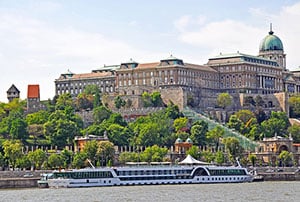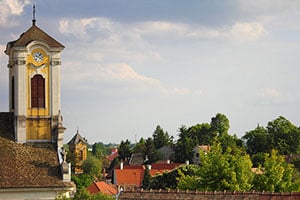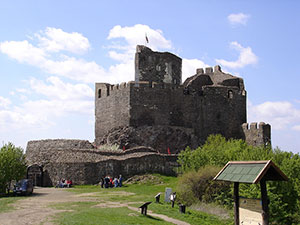Why did you decide to volunteer with Central European Teaching Program in Hungary?

Kayla: This (along with “Where's Hungary?”) is probably the question I get asked most frequently. I was in my last year of college, and I think there's always that looming pressure of “what do I do after I graduate?” I wanted to go to graduate school, but I also figured that I'd been a student for around 80% of my life, and I thought that was good enough a reason to try being a teacher for a bit.
Also, who doesn't want to go see the world while they're still young? The question of why Hungary and why CETP is surprisingly less complicated though. I'm the kind of person who likes to take something perfectly ordinary and make it a little less conventional, so I wanted to avoid the Asian countries.
To be honest, my first idea was to teach somewhere in Siberia... but I ended up moving west and settling on Hungary. Part of the reason was CETP. Other ESL programs in western Europe seemed broad, spanning throughout a number of countries all over the world. CETP just seemed so focused on Hungary, so personal—it had the flavor of a "Mom & Pop" shop to me, and I think I was right about that.
Our in country director is like a mother hen for all of us teachers throughout Hungary. They do so much to set everything up for us: our rent is paid by the school, we make a normal salary (albeit not much, but just the same as the average Hungarian teacher, so it's a good reality check for the overindulgent American), and they give us a crash course on survival here, among countless other things.

Describe your day to day activities as a volunteer.
Kayla: I teach at a primary school, and in total I teach a couple of classes from the oldest students and the youngest (a few 1st and 2nd grade, a few 7th and 8th). On average, I probably work about 22 hours or so a week, but my schedule day-to-day can be vastly different. Some days I come in as early as 7am or as late as 9am and leave as early as 11am and as late as 2:30pm if I decide to stick around. Sometimes I'll be asked to do a little something extra on the side, like judge an English competition or provide a class for my coworkers, but it's never too much.
Honestly, I consider it a privilege to be able to help out since everyone here looks out for me. A lot of Hungarians schools want a native English speaker to teach some sort of conversational English class, and mine is no different, at least as far as the older students. Since Hungary is not as concerned with planning and rigorous curriculum as the U.S. is, not all schools will provide a book, which can be good and bad.
For these classes, I usually come up with some sort of topic-based discussion because at the upper levels, I think it's important to get students comfortable using the English they know. Vocabulary can always be improved upon, but knowing how to/having the confidence to use the limited knowledge you have is probably one of the most valuable lessons you can learn (and I'm speaking from my own personal struggles with Hungarian).
With the youngest students, I usually teach from a book to build vocabulary and slowly introduce grammar. Even in those classes though, some of the best lessons are the ones where they spend 20 minutes trying to explain something to me. I particularly enjoy these simply because it is completely inconsequential how in/significant the message is in reality (ranging from “I saw you walking to school last Tuesday” to “I'm going to vomit”), they will always speak to you with the utmost urgency—but in this, they learn what works and what doesn't work in effectively communicating thoughts. I guess aside from teaching English, I consider it my personal responsibility every day to make sure the kids feel good about themselves, whether it takes giving out high fives for the minor victories or just saying hello to a kid in the hallway.
What made this experience unique and special?

Kayla: I'm not sure what about this experience hasn't been unique or special to me. I suppose one thing is the country in and of itself. I remember telling my dad the first week I was here that this was such an intriguing place for me personally just because I'd only visited tropical countries previous to this... there are so many things familiar to an average American citizen, but with some ever-so-slight differences (KFC with chicken that's not super greasy!) that can make it a bit jarring at first. I think the fact that I came here with little to no previous knowledge about Hungary made this particularly unique for me.
Most people coming to teach in Hungary seem to have SOME sort of connection, i.e. Hungarian heritage, that makes them seek it out. My closest connection was that I played a piano solo called “Hungary” in the 6th grade. It just seems to be one of those places that everyone learns about as the Austro-Hungarian empire in their high school Western Civilization class and then promptly forgets about afterward. This is unfortunate because it's such a rich culture haunted by a stormy past and filled with some of the most welcoming and hospitable people I've ever met. A sweeping generalization maybe, but I have yet to be disappointed.
My coworkers are delightful despite the fact that I speak about 6 words of Hungarian, and my students are absolutely charming. Aside from that, I think my decision to be placed in a smaller town rather than Budapest, as many people opt for, was really the icing on the cake.
A lot of people here ask me why on earth I would pick any place in the Hungarian countryside over Budapest, but in the States, I live in the countryside outside of an average city in Illinois, so I feel extremely at home here. Plus, I get to meet people who don't live in an international city and who don't run into a native English speaker everyday, so I'm a bit of a commodity here. That alone makes the experience special.
How has this experience impacted your future?

Kayla: On the most basic level, I graduated with two degrees, one of which was in Anthropology, so I've always been interested in people and cultures (and graduate school), but I've never really had a clear direction (which is unfortunately something you need in graduate school). While I've been here though, I've observed so many fascinating cultural phenomena rooted in social and political history that I could probably write six dissertations and still never get bored with the Hungarian culture. Also, since my ultimate goal is to become a professor, it's always good to get in some real teaching experience along the way—that is, if I don't want to become one of those that gets so consumed with their research that they forget to instill the passion in the up and coming generations.
And while this experience seems atypically suited to my professional aspirations, I think anyone considering graduate school should consider teaching abroad first because it's becoming more and more commonplace for schools to look for potential students who exhibit world experience and have matured past the point of early seminar hangovers and wearing pajamas to lectures.
The added bonus in Hungary is, your low salary will give you a more realistic taste of your graduate school financial situation. In all seriousness, no matter where you want to end up in life, I think getting out of the world you know and the world you are comfortable with is one of the most precious things anyone can gain, and it's a crucial step for any individual to become a more constructive world citizen. Hungary is a remarkable place to achieve this.
One final thought is that some of us from prominent, English-speaking Western cultures have absolutely no concept of the terror people face when being expected to, but not knowing English. If there is one thing I have appreciated in all of my time here, it is the unwavering forgiveness of the Hungarians as I unintentionally butcher their beautiful language every single day. They don't shake their heads or mutter about how I should learn the language if I come to their country. I will never again allow a foreigner to be reprimanded or belittled for not knowing English, and I strongly believe that's something everyone can and should learn from Hungary.